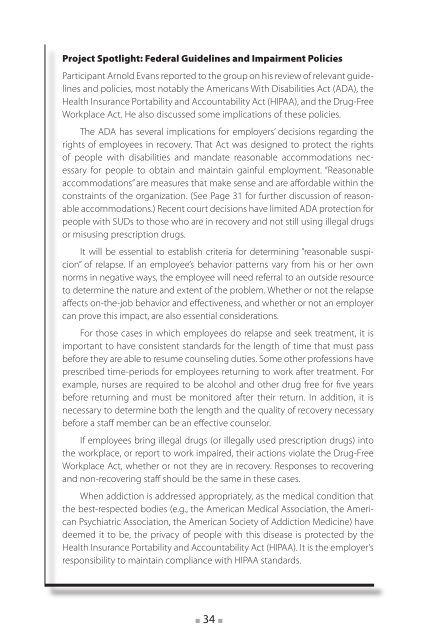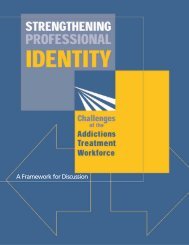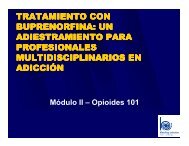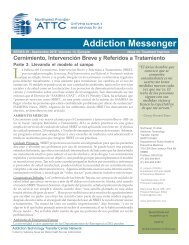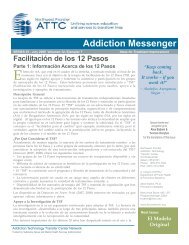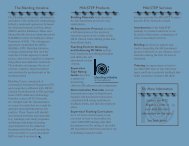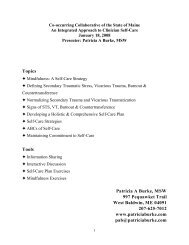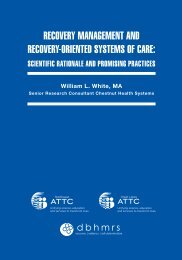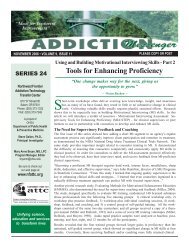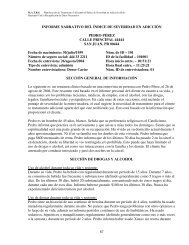alcohol and other drug problems among addiction professionals
alcohol and other drug problems among addiction professionals
alcohol and other drug problems among addiction professionals
Create successful ePaper yourself
Turn your PDF publications into a flip-book with our unique Google optimized e-Paper software.
Project Spotlight: Federal Guidelines <strong>and</strong> Impairment PoliciesParticipant Arnold Evans reported to the group on his review of relevant guidelines<strong>and</strong> policies, most notably the Americans With Disabilities Act (ADA), theHealth Insurance Portability <strong>and</strong> Accountability Act (HIPAA), <strong>and</strong> the Drug-FreeWorkplace Act. He also discussed some implications of these policies.The ADA has several implications for employers’ decisions regarding therights of employees in recovery. That Act was designed to protect the rightsof people with disabilities <strong>and</strong> m<strong>and</strong>ate reasonable accommodations necessaryfor people to obtain <strong>and</strong> maintain gainful employment. “Reasonableaccommodations” are measures that make sense <strong>and</strong> are affordable within theconstraints of the organization. (See Page 31 for further discussion of reasonableaccommodations.) Recent court decisions have limited ADA protection forpeople with SUDs to those who are in recovery <strong>and</strong> not still using illegal <strong>drug</strong>sor misusing prescription <strong>drug</strong>s.It will be essential to establish criteria for determining “reasonable suspicion”of relapse. If an employee’s behavior patterns vary from his or her ownnorms in negative ways, the employee will need referral to an outside resourceto determine the nature <strong>and</strong> extent of the problem. Whether or not the relapseaffects on-the-job behavior <strong>and</strong> effectiveness, <strong>and</strong> whether or not an employercan prove this impact, are also essential considerations.For those cases in which employees do relapse <strong>and</strong> seek treatment, it isimportant to have consistent st<strong>and</strong>ards for the length of time that must passbefore they are able to resume counseling duties. Some <strong>other</strong> professions haveprescribed time-periods for employees returning to work after treatment. Forexample, nurses are required to be <strong>alcohol</strong> <strong>and</strong> <strong>other</strong> <strong>drug</strong> free for five yearsbefore returning <strong>and</strong> must be monitored after their return. In addition, it isnecessary to determine both the length <strong>and</strong> the quality of recovery necessarybefore a staff member can be an effective counselor.If employees bring illegal <strong>drug</strong>s (or illegally used prescription <strong>drug</strong>s) intothe workplace, or report to work impaired, their actions violate the Drug-FreeWorkplace Act, whether or not they are in recovery. Responses to recovering<strong>and</strong> non-recovering staff should be the same in these cases.When <strong>addiction</strong> is addressed appropriately, as the medical condition thatthe best-respected bodies (e.g., the American Medical Association, the AmericanPsychiatric Association, the American Society of Addiction Medicine) havedeemed it to be, the privacy of people with this disease is protected by theHealth Insurance Portability <strong>and</strong> Accountability Act (HIPAA). It is the employer’sresponsibility to maintain compliance with HIPAA st<strong>and</strong>ards.n 34 n


